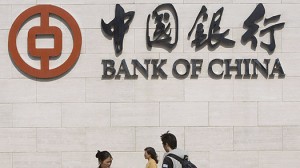Editor’s Note – Fiat, margin calls, puts, options, bubbles, portfolios, mortgage backed, toxic assets, and derivatives are all terms spoken hourly since 2008 when the globe began to feel the financial implosion. Never before has any international banking cartel examined China, but that moment has finally occurred.
The IMF is sounding the alarm and this is a cause for concern beyond description. Who in China has been paying attention to their balance sheets and manipulating loans, bonds and trade? Seems experts were too afraid to ask. Ladies and Gentlemen, this could be the most sobering news we are about to witness yet and you can bet here in America, the media will not report it, the Feds will down play it, and the White House will claim plausible deniability, or say its above their pay grade. Check that buckle on your seat belt.
IMF sounds warning for Chinese banking system
China’s banks face ‘steady build-up of financial sector vulnerabilities’, according to IMF report
By Alan Hawkes
A rise in off-balance sheet liabilities and a house-price boom have left Chinese banks vulnerable to heavy losses, the International Monetary Fund (IMF) has said.
In a wide-ranging report into the Chinese financial system, the IMF said that China is facing a “steady build-up of financial sector vulnerabilities”.
“The system is becoming more complex and inter-linkages between markets, institutions, and across international borders are growing. In addition, informal credit markets, conglomerate structures, and off-balance sheet activities are on the rise,” it warned on Tuesday.
The government’s role in allocating credit, as well as broader economic policy, is leading to a build-up in contingent liabilities, the IMF added, although it said it was difficult to quantify the risks given the paucity of data.
Stress tests on the country’s 17 largest banks showed they were resilient to one-off shocks: “If several of these risks were to occur at the same time, however, the banking system could be severely impacted,” the IMF has said
The review is the first time the IMF has reviewed the Chinese banking system. It recommends that the Chinese government intervenes less to keep down the value of the yuan, uses interest rates rather than administrative limits to control credit demand, and allow banks to make commercial decisions on lending.
“Banks’ large exposures to state-owned enterprises, guaranteed margins provided by interest rate regulations, still limited ability and willingness to differentiate loan rates, coupled with the implicit guidance on the pace and direction of new lending, undermine development of effective credit risk management in the banks. It is important that banks have the tools and incentives to make lending decisions based upon purely commercial goals.”
In response to the report, the People’s Bank of China (PBC), the country’s central bank, said: “While the assessment in the reports is, overall, objective and positive, and the recommendations on the future reforms are constructive, a few points are not sufficiently well-rounded or objective, and the timeframe and suggested priorities of some proposed reform measures need to be further analysed.”
In particular, the PBC said China had already moved away from administrative quotas on credit and towards an interest-rate based monetary policy.
China’s breakneck growth has created huge opportunities for investment. But many warn of the significant risks attached, too. Veteran UK fund manager Anthony Bolton, of Fidelity, said on Monday he was employing five different corporate investigation firms to check up on Chinese investment targets after a disastrous year in which the value of some of his fund’s assets have slumped on the suspicion of fraud.

